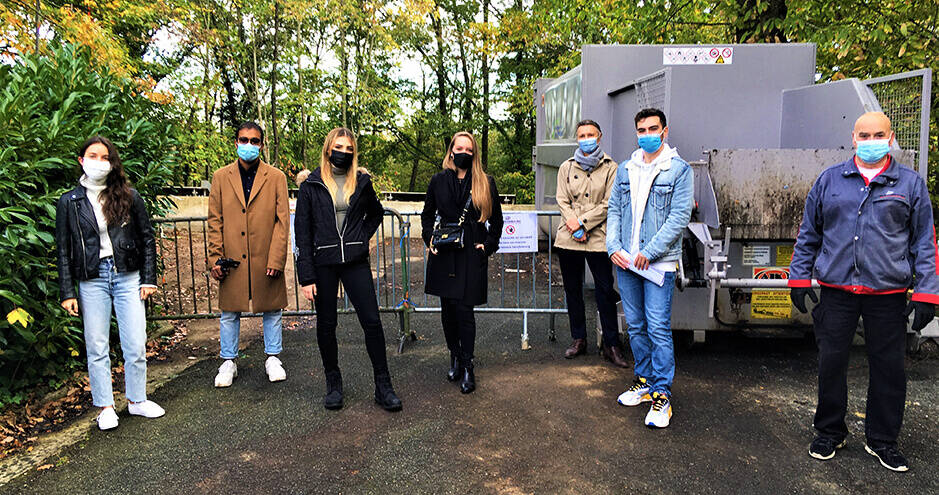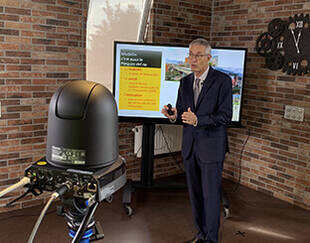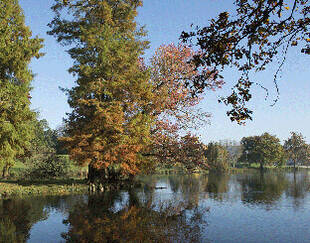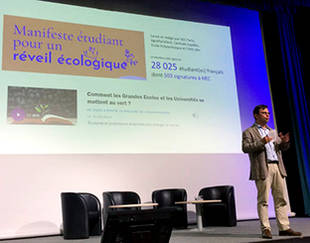HEC Paris Sets Ambitious Targets for Zero-Waste Campus
HEC Paris has extended its commitment to the environment by expanding recycling waste operations initiated on campus in May. The 200m² Greenzone it has created is unique in France, designed to sort out non-biodegradable from biodegradable waste in a drive to create a zero-waste campus. To achieve this, the school aims at drastically reducing the quantity of non-recyclable waste collected by filtering, sorting and valorizing the waste. The challenge has become the source of a student-driven project by one of HEC’s marketing courses.

“This information really needs to be shared more, I had no idea about all these initiatives.” Karoline Keller, a MSc Marketing student, appeared to be convinced by the two-hour tour of HEC’s latest operations to reduce waste on the Jouy-en-Josas campus. Along with five students from the Master in Management (MiM) class led by Professor Sihem Jouini, Karoline is exploring the school’s efforts to jointly reduce the amount of waste sent to landfill, and recycle as much of its food, plastics, bottles, cardboard boxes, cigarette butts and paper as possible. Bringing their on-campus experiences to the fore, she and five fellow-students have not shied away from pointing out loopholes in the system. The students have given a name to their project: “How might we help environmentally-conscious students sort and recycle their household waste in the HEC student residences?” they ask.
Many of the issues they raised, such as the recycling of glass, have long been on the school’s priority list, however. “Clearly this has been in the pipeline for quite a while,” comments Daphne Doukidis. After the morning walkabout, they seemed to have some of the answers to the queries they made. “I’m certainly far more motivated to be eco-responsible,” commented Mayank Sehgal. “And proud of what is being done at HEC Paris,” added Lana Walther.
Input from Recycling Specialists
The students are part of Sihem Jouini’s Design & Product Development class. The group of six will be sifting through their ongoing research to hand in a class report by mid-November proposing systemic improvements on the school’s commitment to lighten its ecological footprint. While there might be still a way to go to catch up its counterparts, mainly in the U.S., Scandinavia and Spain, HEC’s recycling acceleration in 2020 has already had a visible impact. These initiatives range from composting food waste and training its catering staff, to recycling cigarette butts or plastic coffee cups. Not content with being judged France’s most environmentally-friendly business school, it has spent the past five months investing in diverse operations to reduce or recycle the estimated 514 tons of waste its on-campus occupants produce annually. For this, the head of the sustainable development, Christophe Ollé, has chosen two experienced businesses to help organize operations, Derichebourg Multiservices and Tri.O Greenwishes.
The former has been collaborating with HEC in the upkeep of its 340 acres for years and oversees the implementation of a made-to-measure program from the latter. Its project manager, Clément Ollé (who happens to be Christophe’s son), took the students to each of the key sites set up by Derichebourg, starting with the 15m3 compacter. “This is where non-recyclable waste is reduced before being sent to a site energy valorization near Villejust. There, it is transformed to feed into an urban heating system, thus providing a valorization energy.” Such valorization has a cost for the school, however. “For each ton of non-recyclable waste, HEC must pay €163, 18 percent of which goes to the state” explains Christophe Ollé. “And this is set to increase by almost 200% in the next three years. So, there is also an economic incentive to increase our efforts towards zero waste.”
Clément Ollé turns to the dumpster designed for waste that is hard to dispose of (scrap metal, glass, plastic, cardboard). “On the other hand, the school sells the items which are recyclable. At the moment, for example, metal goes for €35 per ton, the paper sells at €70 per ton and plastic is worth €30 per ton.” Clément guides the students to the large R2 warehouse, which is part of the Greenzone, not far from the school’s entrance. This harbors a B20 cardboard box compressor that has been working overtime since September. The 3.36 tons of discarded boxes collected in that time have been transformed into 12,000 brand-new boxes that Tri.O Greenwishes has reintroduced into the market.
Higher Visibility, More Awareness
Next to the B20, Derichebourg employees Eduardo and Mody are busy on "source separation”, a vital element of recycling waste. “Both workers have been hired fulltime to separate and organize all the waste,” continues Clément Ollé. “Not only does this guarantee that the right items go in the right place, it also creates employment. The campus dwellers are not yet fully cognoscente with the division of recyclable items here,” says Christophe Ollé. “It’s still early days. We’re working with HEC’s Student Affairs on a detailed guide which will be published online by the end of the year.” He is also collaborating with François Collin, the recently-appointed Director for Climate and Environmental Sustainability, to sensitize students on the stakes behind a zero-waste campus. This engagement is being driven by HEC’s Society & Organizations Institute who was represented during the tour by project manager Elisabeth de Reals.
Higher visibility and better communications are a concern shared by the other company HEC has partnered up with, Tri.O Greenwishes. “We are working on campaigns to install the “correct actions” in terms of recycling (by those on campus),” says its president, Matthieu de Chanaleilles. “We’ll soon be installing personalized animations, made-to-measure with what we will be collected.” In a long telephone exchange, commercial director Antoine Noblet insists on his company’s adaptability: “We’ve proven our agility with collaborations with the likes of Station F and Le Bristol. These are cosmopolitan hubs, so the fact that HEC campus hosts over 100 nationalities and their different recycling cultures doesn’t scare us. On the contrary, we hope it can enrich the debate!”
Clear Targets for 2021
It hasn’t taken long to see an improvement in the recycling behavior of the 2,000 students in residential homes, the 4,000 others involved in short-term studies, the 700 collaborators and the hundreds of visitors. Since the program’s formal launch in July, there has been a 10% drop in non-recyclable waste. 300 m3 of water was saved and 9 tons of wood was recycled. Overall, the recycling every month so far is the equivalent of 1,728 wine bottles, 2,282 plastic bottles of 75cl and 12,000 cardboard boxes. The catering staff, meanwhile, has also responded positively to the composting efforts of wasted food (in 2011, the FAO estimated that one-third of the globe’s processed food is thrown away). “What’s needed now is a concerted effort in communicating what’s been achieved so far,” insist Karoline Keller and Mayank Sehgal, in unison. “The key for leveraging what is being done is to become a branding university.”
Meanwhile, the school’s focus is on increasing the recycling of glass. “Throwing away glass is costly,” says Christophe Ollé. “It’s heavy and yet can be recycled 100%. So, you will be seeing us more than doubling the number of skips on campus by January.” Even before then, as mentioned earlier, Ollé and his team will be publishing an online guide sharing with students all the necessary details to further transform an already green campus.
Thus, HEC has set itself clear targets for waste elimination, which include a reduction of 25% of the non-biodegradable waste it produces within a year. The school also aims to inspire campuses around the country and beyond. To coin the well-known 19th century English novelist, Thomas Love Peacock: “The waste of plenty is the resource of scarcity.”
Related News

HEC Paris and the Bouygues industrial group jointly launched the “Smart City and the Common Good” Chair. It will be headed by Professor Bertrand Quélin until 2023. In his October 12 online Masterclass...

Faced with the climate emergency, it is the responsibility of business schools to include environmental challenges and the protection of biodiversity in their curriculums. Last July, HEC Paris was ranked...

Members of the Society & Organizations Center at HEC Paris recently responded to an appeal by Shift Project, aiming to ‘teach all students about climate and ecological issues’. Bénédicte Faivre-Tavignot...